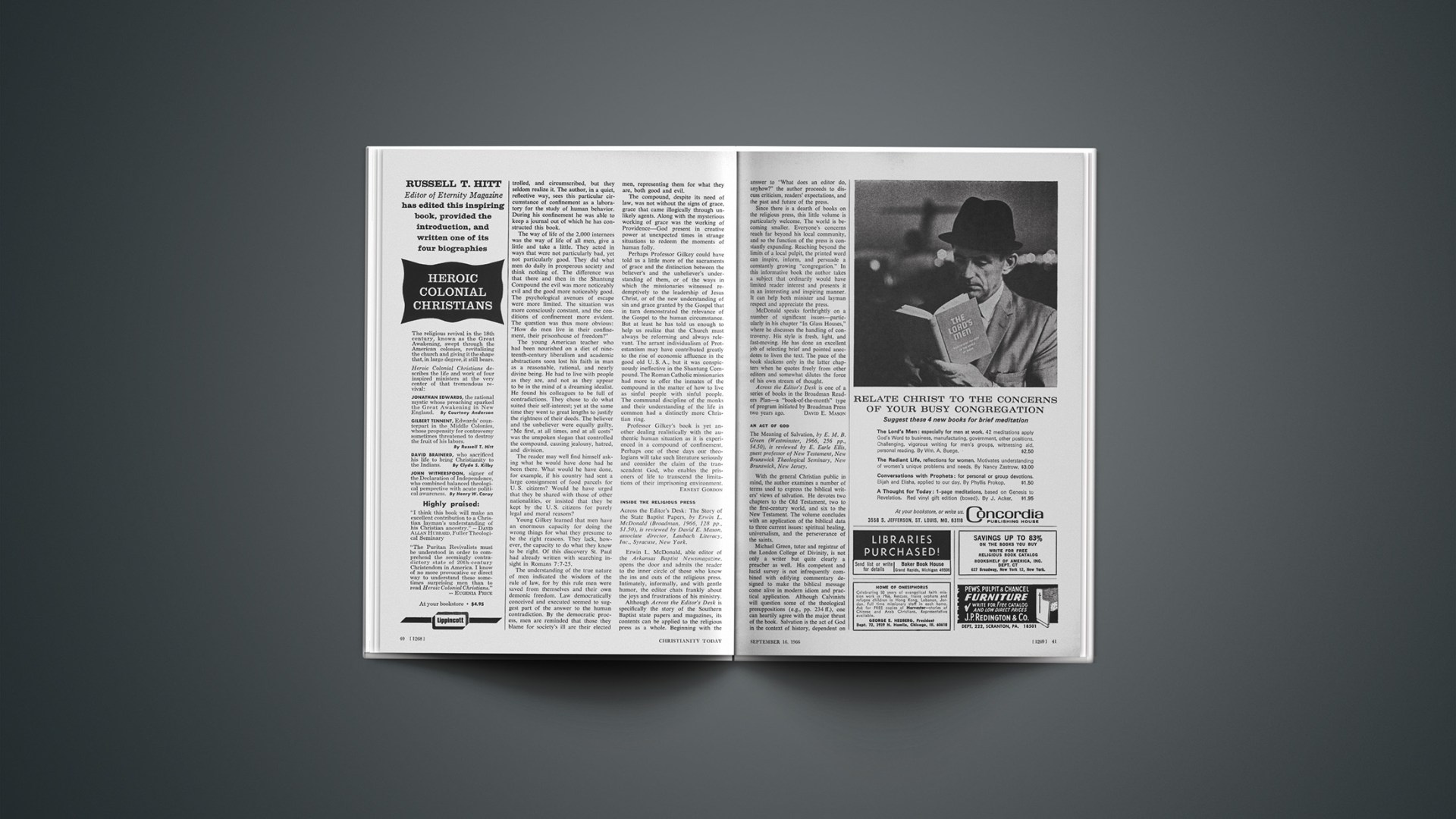Contrasting climates in China, Soviet Union reflect their ideological rift
The split between the Soviet Union and Communist China, which brought bitter new recriminations this month, has its counterpart in their religious climates.
In the Soviet Union, there is just enough freedom that members of the two largest religious groups—Orthodox and Baptist—dare to challenge the government and government-approved religious leaders and call publicly for true liberty.
In paranoid, increasingly militant China, persecution of Christians is reaching new heights, threatening to drive completely underground the faith that claimed five million adherents before the 1949 Red take-over.
As if to underscore the relation of the two trends, the same super-Communist youth element that demonstrated against Soviet policies late last month also attacked the major Roman Catholic and Protestant churches remaining in Peking.
At South Cathedral, center of Catholicism in the capital city, rioters brushed black over paintings of Jesus and various saints, broke windows and statuary, and pasted anti-bourgeois slogans on the walls. Along with similar posters and banners at the Protestant church, the youths rearranged the sanctuary to center on a bigger-than-life bust of Communist Party chief Mao Tse-tung, Reuters reported.
Excerpt From Soviet Baptist Petition
“It is not an accident that [Article 124 of the Constitution of the U.S.S.R.] is powerless, because it was purposely made that way. It was not such at the beginning but, having been amended twice, its democratic character was degraded and it came to us already degraded and powerless.…
“The amendment of the provision, insignificant at first, gave the opportunity to carry out the program of mass repression. In the effect, thousands of believers perished. They died in masses in prisons and camps. In vain did their children, wives, and relatives wait; they will never know where their dear ones’ ashes lay to rest. Only God knows where their brotherly mass graves are.
“Could one say that all these horrors have passed? No. The crime has not ended. It continues. And here is a living evidence of it: At this time, as you are reading our petition, at the very same time, hundreds of the believers, illegally deprived of their liberties, are in prisons, camps and places of deportation, and several died as martyrs. Children have been taken away from the believing mothers; thousands of Evangelical Christian Baptist communities are outlawed; their meetings take place in private homes which have room for some 25 to 30 per cent of the community members; in addition, and under such conditions, the believers cannot peacefully assemble, because, very often, the meetings of the believers are broken up by the militia and members of brigades, and the houses are taken away.…”
(Translation by the Library of Congress)
The attacks by so-called Red Guards, apparently with official blessing, were part of the new campaign to purge China of any vestige of foreign influence (see editorial, page 29).
Reports that the government had ordered the closing of all churches coincided with the sacking of the major Catholic church in Canton. Police also shut Peking’s Sacred Heart Academy, the last Christian school in the nation, which instructed diplomats’ children. This month eight aged nuns who taught there crossed the border into Hong Kong, accompanied by taunts from a mob of 800 Red Guards. One of the nuns died soon after reaching freedom.
Hopes for moderation are dimmed by the apparent rise of Defense Minister Lin Piao to the number-two position behind Mao. He wrote the 18,000-word military manifesto last year, considered the major blueprint for Chinese world conquest.
The current Soviet scene is similar, on the surface. A teachers’ magazine last month revealed the jailing of six Baptists for baptizing forty youths in the River Don near Rostov the day after May Day, including a girl convert from the Young Communist League. They were also convicted of running a Sunday school, which is illegal under a new law designed to hinder Baptists.
Vladimir Kuroyedov, chairman of the Commission on Religious Affairs, denied there is persecution but criticized the Rostov group, which has broken from the officially sanctioned All-Union Council of Evangelical Christians-Baptists. The council represents more than half a million members from its handsome headquarters in Moscow. The Rev. Alexander Karev, general secretary of the official Baptist Union, admitted existence of a splinter group but said that it was small and fanatical, and that his Baptists disapprove of it.
This confirmed other reports of a Baptist underground. This week the National Council of Churches’ Religion in Communist Dominated Areas (a biweekly newsletter) will reprint an Izvestia report on dissident Baptists in Mtsensk, 125 miles south of Moscow, who were persecuted because a member committed murder.
The Red reporter defends the Baptists against charges that they practice ritual mass murder, an old wives’ tale also aimed at Soviet Jews. But he laments local authorities’ “strange and unforgivable inertia” in handling the Baptists.
The Mtsensk group, identified with those who broke with the Baptist Union, petitioned authorities to call a national congress to depose current Baptist leaders and to stop school and government from interfering with religious education.
A similar appeal for civil liberties appears in a letter from two officials of the “Organizing Committee of Evangelical Christian Baptists” to officials revising the Soviet constitution. The remarkable letter, printed in New York’s Russian-language daily Novoye Russkoye Slovo last month, was written in April, 1965, eight months before a similar, previously publicized letter from Orthodox priests unhappy with their hierarchy (see previous issue, pages 56, 57).
The Baptists open by quoting Isaiah 10:1–2, then build a legal case for church-state separation based on writings of Lenin, the original Red Constitution and early Bolshevik policies (during years when evangelicalism achieved great growth in the U.S.S.R.), and the United Nations Universal Declaration on Human Rights, which was signed by the Soviet Union. The Baptists charge continuing persecution (see text below).
Reports on persecution in China differ. The August 28 Christian Century carries a glowing news report of a 1964 trip to China when Anglican Bishop Ting Kuan-Hsun told a guest, “All religious bodies enjoy complete freedom in running their own affairs.”
But the National Council of Churches’ Asia expert, Religious News Service, and the Scottish Episcopal journal SCAN provide extensive reports on severe limitations on the estimated 700,000 Chinese Protestants, including imprisonments, church and school closings, and a tight ban on Christian education and evangelistic preaching.
Norway: Church-State Shift?
This fall, Norway’s Storting (parliament) considers a new law that would change church-state relations for the first time since 1891.
The proposal would change the age at which a person—with or without parental consent—may transfer membership from the Lutheran state church. It also would grant national tax money to every officially registered denomination, based on the number of members over 18.
The proposal, which is causing great discussion among Norwegian churchmen, also would allow non-Lutherans to teach religion in public schools if their churches hold the same major doctrines as the state church. The proposal would void the present requirement that public school administrators be Lutherans.
Under the 1891 law, still in effect, persons under 15 may not leave the state church. The new law would permit persons 14 to 18 to leave the state church with the consent of one parent and persons under 14 to change with the consent of both parents.
Free-church leaders think 18 is too high a minimum age for transfer without permission, while Lutheran leaders generally favor the proposal.
Still Settling World War Ii
The United States government has paid religious and other non-profit organizations $60 million since 1963 for property destroyed or nationalized by foreign governments during World War II.
Claims from U. S. citizens are decided by the three-member Foreign Claims Settlement Commission, formed from out of two other agencies back in 1954.
First Baptist Jail
Lonnie Shull, Jr., a South Carolina pastor, will feel right at home if he lands behind bars. Now that his First Baptist Church has decided to sell its outgrown building to the town government, the old sanctuary will become the new jail. The rest of the centrally located building will serve as city hall and fire station.
Baptist Press reports Police Chief Herman Curtis hopes to see the preacher come back a lot—“to visit and counsel with the prisoners, of course.”
Oh yes—the town is Liberty, South Carolina.
The $60 million involves forty-two claims from large American groups, including losses to numerous individual missionaries and some damage to mission hospitals and schools. Payments have been almost evenly divided between Protestant and Roman Catholic organizations.
In all, the commission has processed 600,000 claims, and has approved two-thirds of them for total payments exceeding half a billion dollars. The money comes from war claims paid to the United States by foreign countries and from foreign assets in the United States seized by the federal government during the war.
Pointing The Way. Churches And Other Institutions In Washington, D. C., Are Entitled To Directional Signs Such As The One Above For $30 Each With A Limit Of Two Per Customer. They Are Uniformly Green And White, Similar To Street Signs, And Serve To Reduce Roadside Clutter (No Other Kind Of Sign Is Permitted On Public Space).
Warning On Church Homes
From the floor of the U. S. Senate last month came a word of caution to churches that get mixed up with homes for the aged. Republican Senator John J. Williams of Delaware said many churches become victims of promoters who chalk up big profits by making the congregations think they are providing homes for senior citizens. The promoters induce churches to accept 100 per cent financing from the federal government, collect a fat fee for setting up a home, then pull out without worrying about who will pay back the money.
Unfair Competition?
Churches and other tax-exempt organizations are buying more and more businesses these days, and Uncle Sam proposes to put a stop to the practice. The U. S. Treasury is backing bipartisan legislation to end the tax advantage in the sale of businesses to tax-exempt groups.
A Treasury official told the House Ways and Means Committee last month that unless corrective legislation is enacted, there may be a “substantial shift” of ownership of income-producing property to tax-exempt organizations. He warned that some tax-free groups are in fact advertising that they are in the market to buy up business enterprises.
Experts trace the pattern to a loophole cited by a 1965 Supreme Court decision. The court ruled that under present law a non-profit group can buy a business and run it and both the buyer and the previous owner can benefit from the special tax advantage afforded the tax-exempt buyer.
No Religious Census
Questions on religion are unlikely in the 1970 U. S. census, according to Religious News Service.
Census director A. Ross Eckler was quoted as saying that opposition has been strong. He told a House subcommittee last month that opponents of religious questioning had warned that it constituted invasion of religious freedom.
Bishop Paul F. Tanner, general secretary of the National Catholic Welfare Conference, told the subcommittee that information obtained on religion would “serve a valuable purpose.” He recommended that replies to questions on religion be made voluntary.
Tanner’s testimony disputed Eckler’s in that the churchman said a public-opinion poll agency had found practically no resentment toward census religious questions.










